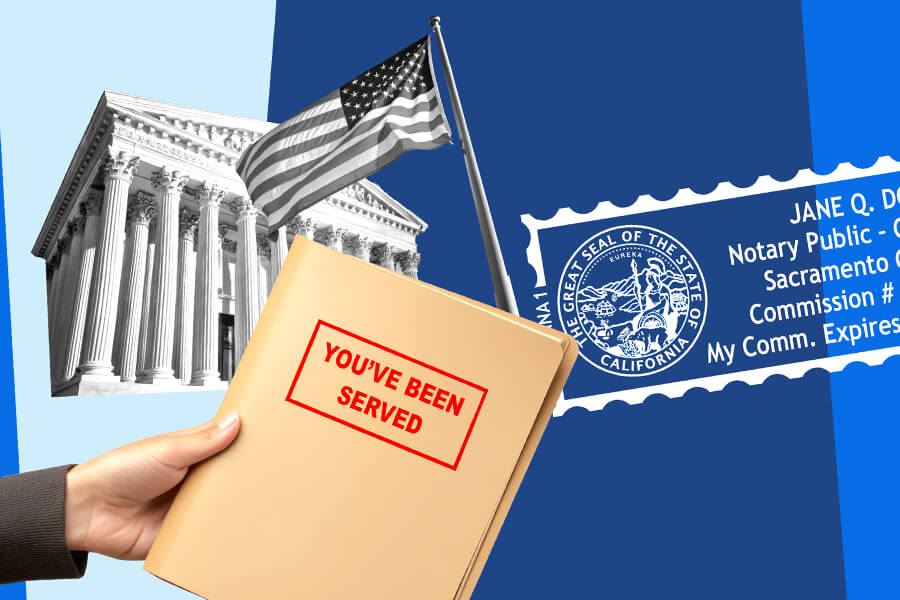
Since the dawn of civilization, Notaries have been essential to authenticating identities, documents and transactions, lending them trust with unmatched confidence. But like everything else in life, the process isn’t perfect. Sometimes, when problems arise, Notaries can find themselves in court.
Whether the issue was caused by a mistake, lack of training, or even a Notary intentionally bending or breaking the rules, the penalties can be painful. Following the Notary Public Code of Professional Responsibility can help avoid these pitfalls, especially with fraud, forgery, and imposture on the rise.
The following 10 cases, compiled by the National Notary Association, serve as a reminder and warning about what could happen when things go wrong.
Letting your attention to detail slip.
Mistakenly using an expired Notary seal
An employee Notary mistakenly used an expired seal on a corporate document, rendering the notarization invalid. The customer required a new notarization, and the company had to pay $700 to redo the paperwork. Takeaway: Use your Notary seal properly.
Using the wrong notarial certificate
A Notary used an incorrect notarial certificate, which resulted in the recorder’s office rejecting a deed of trust. The mistake caused recording delays and legal proceedings, in which the Notary testified. Ultimately, the Notary was removed from the case, but not before her attorney fees amounted to $20,000 of her $25,000 E&O policy. Takeaway: Double-check that you are using the correct notarial wording.
Trouble with remote online notarization (RON)
A Notary authorized to perform remote online notarizations completed a signing that turned out to be fraudulent. The video recording of the transaction indicated that the Notary did not follow proper procedures by failing to examine the signer’s ID documents properly and permitting a second person in the room to assist the signer with the knowledge-based authentication questions. The case landed in court and the Notary incurred $75,000 in settlement and legal fees, which was paid out of her $100,000 E&O policy. Takeaway: Always follow proper procedures for remote online notarizations.
Getting caught up in a fraudster’s scheme.
Fraudulent notarization without the Notary’s knowledge
A Notary was accused of notarizing a warranty deed fraudulently, though she had never met the signer and had no record of the signing. Later, it came to light that the seal was forged and did not match the Notary’s official seal. She promptly reported it to the police and was cleared of wrongdoing, but her E&O policy was hit for $14,000 in attorney and legal fees from her $25,000 limit. Takeaway: Report stolen or forged Notary seals and journals immediately.
Notarizing through a car window
After being pressured and rushed by a scheming signer, a Notary quickly notarized a warranty deed from inside her car without properly verifying the signer’s identity. What she missed: The name of the signer in the Notary’s journal did not match the name of the taxpayer identified as the grantor on the warranty deed. The matter was settled in court for $55,000, and the Notary incurred $18,000 in attorneys’ fees, which ended up being a big hit to her $100,000 E&O policy. Takeaway: Never relax your standards in a rush.
Leaving a Notary acknowledgment behind
A Notary was recently sued in connection with an allegedly fraudulent real property conveyance that required acknowledgments from two different signers. The Notary properly notarized the signature of one signer, but after a series of complicated events and manipulation from the first signer, the Notary ended up leaving an incomplete acknowledgment certificate behind. Ultimately, the Notary’s seal impression was copied from the first acknowledgment and fraudulently placed on the second. The fraudulent deed transferred property without the real owners’ consent. The claim was settled for $20,000. Takeaway: Never give partially completed notarial certificates to a signer for any reason.
Cutting corners and bending rules.
Remote notarization without authorization
A Notary got into hot water while doing a personal favor for a friend during COVID. The signer needed to be appointed executor of a deceased parent’s estate, but lived in a different state than the Notary. The Notary performed the notarization via Skype, even though she was not commissioned as an electronic Notary. Then, she affixed her seal to a scanned document and emailed it back. A court rejected the document for being too blurry, and a lawsuit followed. Legal costs were incurred, and the Notary will likely lose several thousand dollars of her $25,000 E&O policy. Takeaway: Don’t ever bend the rules for anyone.
Knowingly accepting a fake ID
This lawsuit arose in connection with a fraudulent real property transfer. A Notary completed an in-person notarization and journal entry with a fingerprint, but admitted to knowing the signer’s ID was forged. This led to a fraudulent property transfer, costing the plaintiff $700,000. The Notary’s $100,000 E&O policy was exhausted. Takeaway: Never proceed if you suspect an ID is fake.
Poor recordkeeping
After receiving a complaint against a Notary, the Secretary of State launched an investigation into the Notary in connection with the notarization of an alleged fraudulent grant deed. The investigation uncovered that the Notary committed several repeated statutory violations, including: (i) failure to enter the time and type of each official act, (ii) failure to enter the character of every instrument sworn to, affirmed, acknowledged, or proved before the Notary; (iii) failure to enter all required elements of the document used to establish satisfactory evidence of identity, (iv) failure to enter the fee charged for the service, and (v) failure to obtain a thumbprint of individuals whose signatures were notarized in connection with power of attorney documents and documents affecting real property. As a result, the Notary’s commission was revoked. Takeaway: Always keep a meticulous journal or risk losing your commission.
Doing things right but still ending in court.
Complications with a holographic will
A Notary properly followed identification and notarization procedures for an elderly signer’s handwritten will. However, they were still caught in a probate dispute challenging the will’s validity. Ultimately, the Notary was dismissed from the disputing parties’ global settlement, but the Notary exhausted $7,000 in legal fees from their $25,000 E&O policy. Takeaway: Even when done correctly, notarizing wills can lead to legal complications.
Protect yourself with knowledge and diligence.
These real-world cases highlight how easily Notaries can face legal trouble due to mistakes, pressure, or fraud. While an Errors and Omissions insurance policy offers peace of mind, the consequences can still be costly.
The best way to protect yourself? Know your state’s Notary laws and follow them to the letter. Always verify identities, keep detailed records, and never let anyone rush or pressure you into cutting corners. Your role is vital to preventing fraud and ensuring the integrity of important transactions — so stay vigilant, and you’ll stay protected.
Phillip Browne is the Vice President of Communications at the National Notary Association.

